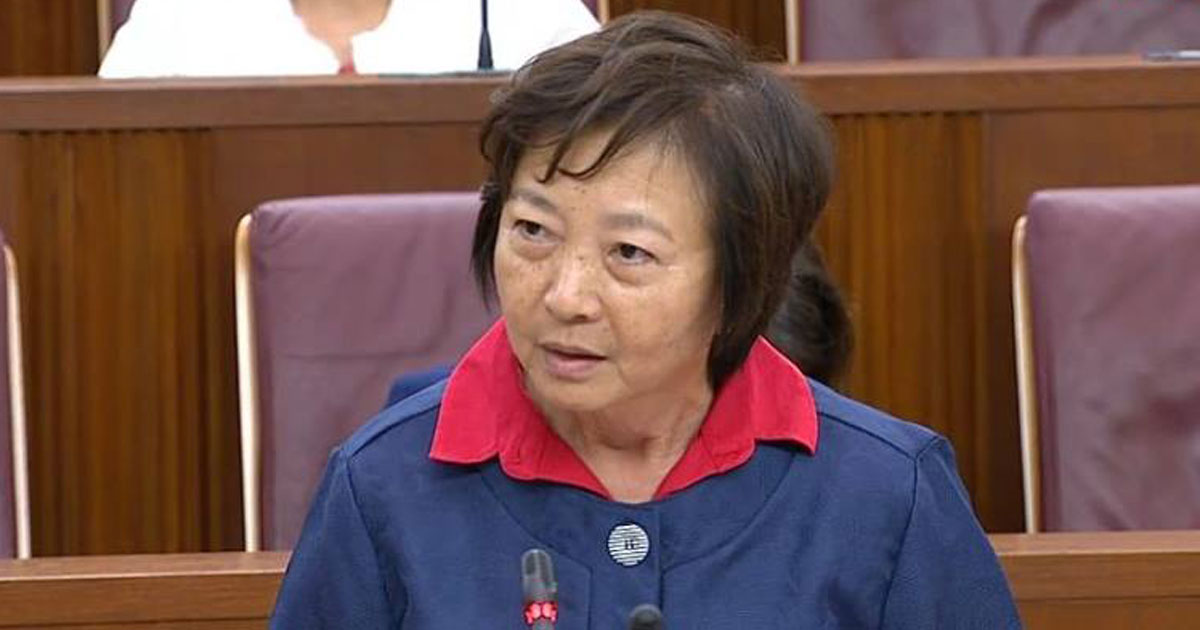Nee Soon GRC MP Lee Bee Wah has taken to Facebook to reiterate that she was not speaking out against animal lovers and activists in Parliament.
The Facebook post on Thursday, Feb. 14, said the animal lovers and activists may have misunderstood what she said earlier on Tuesday.In her post, Lee said nowhere in her Parliament speech was she criticising anyone, and that she was proposing that humans and animals live together harmoniously.
However, there was the need to take a "balanced approach" to animal management and to be mindful of the safety and welfare of her residents as well, as they do not know how to deal with the presence of wild animals, such as pythons emerging from drains in the neighbourhood.
What Lee said
During her Parliament speech on the National Parks Board (Amendment) Bill that was viewed widely online, Lee singled out some cat feeders who were causing a rat infestation in her Nee Soon South ward.
She said: "We found that the root cause is actually the food left behind by cat feeders. Several cat feeders, not just one, and when they walk away, the rats come and eat, the big cockcroaches come and eat. And I asked NEA (National Environment Agency) to act."
Lee added: "They say cannot, there was an agreement by AVA (Agri-Food and Veterinary Authority of Singapore) and Cat (Welfare) Society, to leave food there for two hours. So many cat feeders, with many two hours, how to solve the rats issue?"
Her speech elicited laughter from other MPs as she called for the the two-hour feeding period to be removed.
Lee's remarks met with Cat Welfare Society response
The Cat Welfare Society responded with a strongly worded note on Facebook.
It said cat feeders and the community cats they care for “do not deserve to be laughed at” and they should not be threatened by the extermination of the cats.
CWS said they work with the NEA and AVA to penalise cat feeders who flout the rules and reiterated that those who take care of community cats are doing so out of their own pockets.
Government urged to look into issue now
In her post, Lee said she had, in fact, advocated more to be done for animals as she called upon the authorities to take stronger action against illegal fishing, which can cause overfishing and damage to biodiversity.
“I am glad that the Government agreed to look into this issue. Otherwise, we would never be able to solve the persistent problem with rats in HDB estates. And residents will suffer,” she added.
This is Lee's post in full
[The right balance between protecting animals and addressing residents’ safety concerns]
I have been given feedback that some animal lovers and activists may have misunderstood my speech on the animal management in HDB estates. Some thought I was speaking up against animals and activists. This is not the case. Nowhere in my speech was I criticising anyone - except for those behind irresponsible cat feeding and illegal fishing which harmed otters. I encourage them to watch my full speech.
On the contrary, I made it clear in my speech it is right and important to live harmoniously with animals in their natural habitat. We need to protect them and their surrounding biodiversity. In fact, in the same speech, I called upon the authorities to take stronger action against illegal fishing which can cause over-fishing and damage to biodiversity. I pointed out that the careless use of hooks by illegal fishermen can be harmful to otters. Some litter their hooks which are dangerous to humans. I also welcomed more outreach and education for our young on animal welfare. And we have to encourage and work with animal welfare groups – all of us have the same goal, which is to have sustainable, responsible management of animals, environment and good interactions with our residents.
It is important to take a balanced approach towards animal management. It is important to protect wildlife, and we also have to be mindful that residents’ safety and a hygienic living environment is the most important. Without residents’ support, it is not going to be easy to protect wildlife.
I gave the example of a python found outside HDB unit. This had caused much alarm to residents on the ground floor. Faced with a python in a drain in front of her flat where her grandchild is sleeping, a grandmother was rightly worried about the safety of her family. This is where we need to strike a balance between protecting the animal and addressing the genuine concerns of residents who do not know how to handle such animals. The police and the town council are not trained to handle them safely. Animal activists say they are in their natural habitat. While I agreed with them, I also empathize with concerned residents, especially those with young children. Their safety and welfare is important.
Besides the appearance of snakes, increasingly, monkeys are being found in densely populated HDB vicinity such as bus stop and bridges. Likewise, under such circumstances, residents have the right to be concerned and to request for help from the relevant authorities. I therefore urged AVA to set up a unit where experts can be called upon to deal with such situations where residents feel their safety is threatened.
I also spoke about irresponsible cat feeding. I was calling for action to deal with irresponsible feeders who leave food unattended for two hours in rat infested areas. By leaving food unattended for too long, irresponsible feeders create hygiene problems for residents as big rats and cockroaches feed on them. I am glad that the Government agreed to look into this issue. Otherwise, we would never be able to solve the persistent problem with rats in HDB estates. And residents will suffer.
If you like what you read, follow us on Facebook, Instagram, Twitter and Telegram to get the latest updates.
